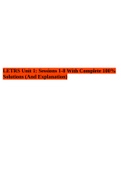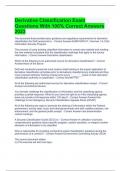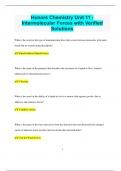1. SITE ACQUISITION: PRELIMINARY STEPS
2. MANAGING ENVIRONMENTAL RISKS
3. THE CONTRACT
4. PLANNING PERMISSION
5. PLANNING ENFORCEMENT
6. THE CONSTRUCTION AND DESIGN TEAM
7. DEFECTS IN DESIGN AND CONSTRUCTION
8. LEASES: REPAIR, INSURANCE, SERVICE CHARGE
9. LEASES: RENT REVIEW
10.
, WORKSHOP 1: Site Acquisition: Preliminary Steps
METHODS OF FINANCE
1. SHARE CAPITAL
Where the buyer is a company, it may consider issuing further shares to raise
additional capital to invest in property
May not be popular with current shareholders as it dilutes shareholdings which can:
Reduce dividends
Affecting voting power
Change capital rights
Publicly listed company – additional regulations to consider before any such fund-raising may be
considered
2. FORWARD FUNDING AND EQUITY FUNDING
Institutional investors (pension and life insurance funds) have substantial sums of money
at their disposal for investment
May invest in property in addition to shares and bonds to maintain a balanced
investment portfolio. This investment may take the form of:
Simple purchase of an established commercial property that has been let, which will
provide income stream from tenants and capital value increasing
Take an active part in the development of suitable property
FORWARD FUNDING
Institutional investor finances the development from the outset, acquiring the land and
paying all construction costs
Developer is paid a fee for their work and once the development has
been completed and let (to tenants with an agreed covenant strength),
is paid a profit share
Developer may be prepared to accept a lower profit because there is
less risk to the developer than if it developed the property using its
own funds
The investor will hope to have paid less for the completed and let
property than if it had waited to buy the property until after the
developer had built and let it
EQUITY FUNDING
Investor and a developer will form a joint venture company to acquire the
development site and undertake the development
Investor takes preference shares in order to be assured of a priority return on its
investment
Investor is participating in profits and losses of the development
, 3. SALE AND LEASEBACK
Owner-occupier of a freehold property can raise funds against the value of its property and
remain in occupation by entering into a sale and leaseback arrangement
Freehold interest in property is sold, immediately following completion, the buyer leases
it back to the seller / former owner at market rent
Former owner can thus raise capital for other purposes and the buyer will
see a return on its capital investment in the form of rent paid by the owner
4. DEBT FINANCE
Borrow from banks or ‘alternative credit provides’ (insurance companies / debt funds)
If the debt requirement is large, the debt package will often consist of senior debt, provided
by a single lender or syndicate of lenders that will participate in the senior debt and
mezzanine debt (which will be more expensive and only be repaid once the senior debt has
been repaid), provided by a different lender or lenders
Attraction of borrowing is:
o May be entitled to tax relief on any loan interest
o Return from investing the cash might be higher than rate of interest it will pay on a loan
, Description Advantages Disadvantages
Joint Parties enter Very flexible and If one party is
Venture into a contract responsive to parties inexperienced, they will not
Contract which sets out individual needs necessarily know what to
the terms of write into the contract
Good for their If parties already own
simple, well- agreement property, there is no need
defined to transfer the ownership No separate legal
projects for a There is no of the site at the start of the entity, so will have
limited time creation of a joint venture unlimited liability in
scale separate legal relation to any losses
entity Tax transparent – each
party is responsible for
payment of it income tax on Contract must be
its profits and capital gains detailed as there is no
tax statutory code for
unexpected events
Relationship is contractual
so less likely to be liable for
Disposal
actions of another (subject to
inflexibility –
contract)
parties must sell the
property to the end
user.
NO liability for the defaults
of the other party. Each
of the parties will remain
entirely independent of the Both parties are
other. liable for unlimited
losses of the joint
venture
No statutory reporting
requirements
Should the Overall, the Q is do the parties require tax transparency? In other words, separate taxation in
parties use preference to unlimited liability and inflexibility on disposal’?
this
method?












